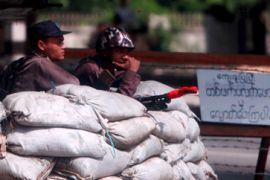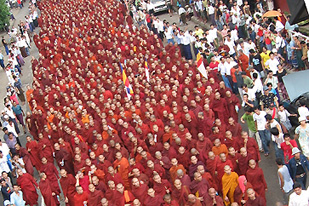Myanmar protests swept away
Al Jazeera’s correspondent finds the army cleaning up after last weeks protests.

 |
| Monks have reportedly been released after being detained during pro-democracy protests [AFP] |
Al Jazeera’s correspondent in Myanmar says the security forces there are continuing to make arrests. He has not been named for his own safety.
Another kind of uniform has emerged on the streets of Yangon.
The bright orange jackets of the street cleaners who have emerged to “tidy” up after the mess made during the crackdown on last week’s protests.
With their wicker baskets and brooms, they busy themselves sweeping and collecting rubbish. And picking up the last of the flip-flops.
They gather hundreds of them. A variety of colours, a variety of sizes.
One of the cleaners showed me his haul. I counted 25.
Thousands of flip-flops were left behind when the police and military began the crackdown.
Alongside videos of the protests, the discarded sandals are an indicator of the panic inflicted as people ran for their lives, dodging the bullets and avoiding the batons.
And for many, the memories of last week’s violence will not fade.
“We will never forget their cruelty,” one man said to me. “Maybe the world will, but we won’t.”
Arrests continue
The daily monsoon rains have washed away the bloodstains on the pavements around the city and I walked past an army truck near Sule Pagoda in the centre of town.
|
“Where are the peace and human rights defenders of the world (the super powers)? They haven’t done enough in this case. Isn’t there oil in Myanmar?” Lost Soldier, Arusha, Tanzania Send us your views |
Soldiers were sitting under the trees, M16’s lying across their legs, they chatted with friends and smiling, exposing betel-stained teeth.
Ibrahim Gambari, the UN envoy was about to leave Yangon when the military carried out a another night-time sweep, this time arresting civilians and protest sympathisers, shopkeepers, for example, who allowed demonstrators to hide from the chasing army.
Wherever the police and military were, there were the cameras, not of activists, tourists or journalists, but military personnel recording the faces of those who took part in the protests.
But as more were arrested, some were freed, my contacts told me.
Between 80 and 100 monks had been released from detention.
They had reported to sign papers promising no further participation in demonstrations and were given 24 hours to pack up and leave Yangon for the countryside.
Poorly paid
I went to one monastery to try to check the accuracy of what I was told.
Within three minutes I was surrounded by four men in plain clothes. “Who are you?” they demanded.
“Who are you?” I responded.
“Immigration,” one man said. “You must leave.”
The soldiers themselves earn “less than $40 a month,” my source explained. “Only from the rank of colonel up is the money good and also the potential to earn a lot from corruption.”
But the common soldier is at the bottom of the pile.
He is treated, my source said, according to the Japanese military principles from the second world war: abuse, mental and physical and public slaps are not uncommon.
UN report
The focus has switched from the humid streets of Yangon and other cities in Myanmar to the air-conditioned corridors, offices and meeting rooms of the United Nations in New York.
Here Mr Gambari’s report of his visit will be made and translated into many languages, to be considered, contemplated and discussed.
The people I have spoken to are not holding their breath.
Some diplomats here, however, are optimistic that the worldwide condemnation of the action of the military will force some kind of dialogue for peace.
But it raises the question: Why would the generals support a democratic process which would ultimately hold them accountable for the brutal actions of the last week?
Few here believe that will happen.
Most believe more blood will have to be spilled in pursuit of democracy.
